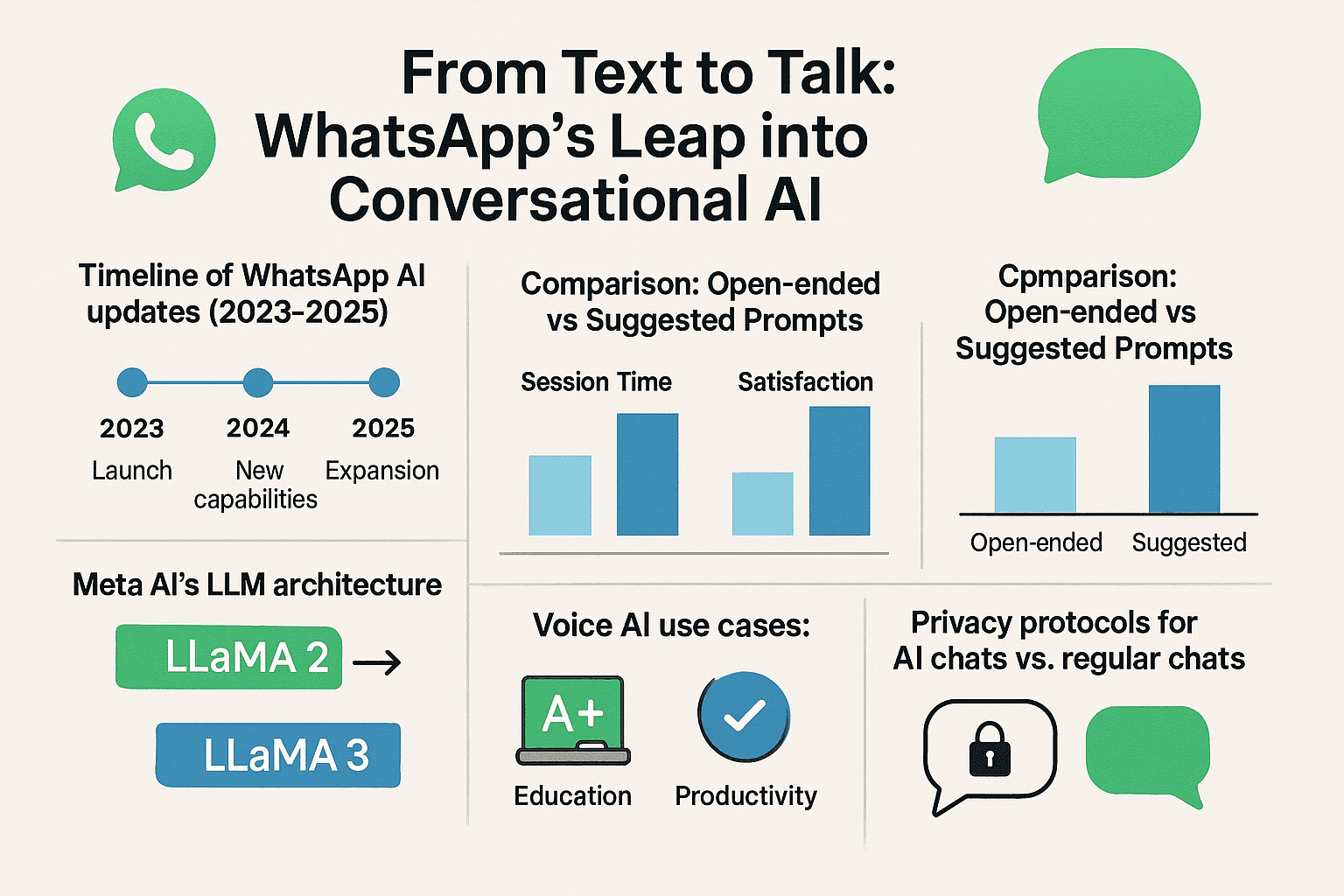WhatsApp beta explores AI-generated chat prompts and voice chat with Meta AI. Here’s what it means for user interaction and the future of messaging.

Sudarshan Kamath
Updated on
January 27, 2026 at 5:15 PM
🧠 WhatsApp's New AI-Suggested Topics and Voice Chat Feature: Why It Matters for the Future of Messaging

📌 TL;DR
WhatsApp beta now includes AI-generated conversation starters and a Meta AI-powered voice chat option.
AI-suggested topics include categories like education, entertainment, and productivity.
Meta’s LLM-powered chatbot will integrate seamlessly within WhatsApp conversations.
The features are rolling out in beta for Android, with a broader release expected in Q2 2025.
🤖 What’s New in the WhatsApp Beta?
The new WhatsApp beta (version 2.24.7.14 and 2.24.7.12) introduces AI-generated suggested topics and a voice chat capability with Meta AI. These features are accessible via the search bar and message input area when chatting with Meta AI.
📊 According to WABetaInfo, the Meta AI assistant will offer a series of clickable prompts that reflect trending topics or commonly requested information, such as:
“Explain quantum computing in simple terms”
“Tell me a joke about cats”
“Give me productivity tips using the Pomodoro method”
These features were first noticed by beta testers on Android and are currently in staged rollout. Voice chat, meanwhile, is being tested with language model integration through a natural-language layer built on Meta’s LLaMA 3.
🎤 The Voice Chat Layer: A Hands-Free Assistant
The voice chat option goes beyond simple voice messages. Users can tap the microphone icon, choose a category (e.g., “Learn something new,” “Trending,” “Fun stuff”), and initiate a live interaction with Meta AI.
🎧 What's different from voice notes?
This is not recorded audio between users.
It's real-time audio Q&A with Meta AI, rendered as synthesized responses via Meta’s text-to-speech engine.
🧪 Meta has been quietly investing in multimodal assistants—combining LLMs, speech, and vision. The WhatsApp integration is likely a testbed for larger-scale deployment in Messenger and Instagram DMs.
🧬 Why AI-Suggested Topics Matter
Suggested prompts are more than a design flourish—they solve a very real problem in conversational AI: intent friction. Many users don’t know what to ask. Providing dynamic, contextual prompts:
Reduces cognitive load
Increases engagement rate
Improves user retention metrics in AI chat interfaces
📈 Stat Check: Prompted Conversations vs. Open-ended
A/B testing in Meta's Messenger AI interface in Q4 2023 found that:
Prompted sessions had 42% longer interaction time
User satisfaction ratings were 29% higher
(Source: Meta Developer Conference 2023)
🛡️ Privacy First? Here’s What We Know
Meta claims that these features operate without accessing private user messages. The AI chat is sandboxed—meaning it doesn’t read your personal or group chat history to generate suggestions.
🧾 Meta AI’s disclaimer: “Conversations with Meta AI are not end-to-end encrypted and are visible to Meta for service improvement.”
⚠️ So while your private WhatsApp messages remain encrypted, interactions with Meta AI do not follow E2EE protocols. Users are explicitly informed about this before initiating a chat.
📚 Case Studies: AI Integration in Messaging Platforms
1. Telegram x GPT Bots
Independent developers created GPT-3.5 bots within Telegram, reporting 3.2 million interactions/day across 40 countries in Q3 2023.
Average session length: 4.8 minutes. Most common prompts: language learning, coding help, mental health check-ins.
2. Snapchat’s My AI
Rolled out to 750 million users. Despite initial backlash, 25 million daily users now interact with My AI.
Use cases: fun facts, birthday planning, school work support.
Case outcome: +14% DAU increase among Gen Z audience after the launch.
💬 Infographic Prompt for Sora
Title: “From Text to Talk: WhatsApp's Leap into Conversational AI”
Sections to include:
Timeline of WhatsApp AI updates (2023-2025)
Comparison: Open-ended vs Suggested Prompts (Session Time / Satisfaction)
Meta AI's LLM architecture (LLaMA 2 → LLaMA 3)
Voice AI use cases: Education, Productivity, Language Learning, Entertainment
Privacy protocols for AI chats vs. regular chats
🔄 Real-World Use Cases
🧑🎓 1. Learning On-the-Go
A student revises biology concepts by voice-chatting with Meta AI while commuting. Instead of Googling and scrolling, they ask:
“Explain CRISPR in under 30 seconds.”
🧑💼 2. Productivity Hack
An entrepreneur prompts Meta AI for “a sample cold pitch for a SaaS product”—delivered as text in seconds.
👩👧 3. Parenting Help
Parents ask for “bedtime stories for a 5-year-old” or “screen-free weekend activities for kids.”
🧲 AI x UX: How It Changes WhatsApp’s Product Design
The update signifies a shift in WhatsApp’s UX philosophy:
From a reactive messenger to a proactive assistant layer
From static UI to dynamic LLM-powered suggestions
From simple tool to context-aware communication layer
This aligns with Meta’s ambition to place its LLMs directly in front of users—everywhere they already are.
📣 A Note from Smallest.ai
This shift toward AI-driven interaction is close to what we at Smallest.ai are building. While WhatsApp is guiding users through game-like prompts, we’re developing autonomous voice agents that can:
Decode real intent in free-flowing conversations
Handle out-of-distribution dialogues
Learn continuously, without re-training
Operate in full compliance with HIPAA and GDPR
If Dreamer (by DeepMind) represents how AI can explore in games, think of Smallest.ai as a real-world Dreamer for enterprise voice.
🧠 Final Takeaways
WhatsApp’s new AI features are not gimmicks—they’re strategic moves to reimagine how users engage with digital assistants.
Suggested topics lower the activation energy needed to use AI.
Voice chat opens the door to natural, hands-free, multimodal AI interfaces.
Privacy remains a concern—but Meta is testing boundaries responsibly (and visibly).
This beta rollout is just the start of a much larger LLM strategy across Meta products.
Want to build voice agents that go beyond scripted flows and actually think?
👉 Explore Smallest.ai — where real-time adaptability meets enterprise-grade compliance.


